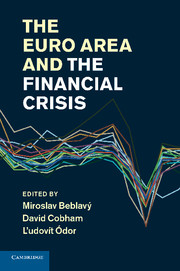Book contents
- Frontmatter
- Contents
- Figures
- Tables
- Boxes
- Contributors
- Abbreviations and acronyms
- 1 Introduction
- 2 Towards a new architecture for financial stability in Europe
- Part I The experience of the crisis
- 3 Weathering the financial storm: the importance of fundamentals and flexibility
- 4 The Irish crisis
- 5 The crisis in Spain: origins and developments
- 6 The financial crisis and the Baltic countries
- Part II Accession to the euro area
- Part III The future of the euro area
- Index
- References
3 - Weathering the financial storm: the importance of fundamentals and flexibility
from Part I - The experience of the crisis
Published online by Cambridge University Press: 07 October 2011
- Frontmatter
- Contents
- Figures
- Tables
- Boxes
- Contributors
- Abbreviations and acronyms
- 1 Introduction
- 2 Towards a new architecture for financial stability in Europe
- Part I The experience of the crisis
- 3 Weathering the financial storm: the importance of fundamentals and flexibility
- 4 The Irish crisis
- 5 The crisis in Spain: origins and developments
- 6 The financial crisis and the Baltic countries
- Part II Accession to the euro area
- Part III The future of the euro area
- Index
- References
Summary
Introduction
The recent global financial tsunami has had economic consequences that have not been witnessed since the Great Depression. But while some countries suffered a particularly large contraction in economic activity on top of a system-wide banking and currency collapse, others came off relatively lightly. This chapter aims to explain this difference in cross-country experience by means of a non-structural econometric analysis using a variety of potential pre-crisis explanatory variables in a cross-section of forty-six medium-to-high-income countries. The severity of the macroeconomic impact is measured in terms of the depth and duration of the contraction in both output and consumption. Potential pre-crisis explanatory variables are chosen to reflect propagation channels for the global crisis typically mentioned in the literature, i.e. a financial channel, a trade channel, a macro channel and an institutional channel, although we offer some new variables that have not been included in such analyses before as far as we know. As another contribution to the analysis of the current crisis, we also use cross-country ordered probit regressions to identify the main determinants of the probability of domestic systemic banking or currency crises during the current crisis period.
Our results suggest that the macro channel played a prominent role, as domestic macroeconomic imbalances and vulnerabilities are found to be crucial in determining the incidence and severity of the crisis. An especially important pre-crisis macroeconomic indicator, which seems to capture factors that are important in explaining the extent of the crisis along many different dimensions, is the rate of inflation in the run-up to the crisis. We also find evidence suggesting the importance of financial factors. In particular, we find that large banking systems tended to be associated with a deeper and more protracted consumption contraction and a higher risk of a systemic banking or currency crisis. Our results suggest that greater exchange rate flexibility coincided with a smaller and shorter contraction, but at the same time increased the risk of a banking and currency crisis. We also find that countries with exchange rate pegs outside the European Monetary Union (EMU) were hit particularly hard, while inflation targeting seemed to mitigate the crisis. Finally, we find some evidence suggesting a role for international real linkages and institutional factors.
- Type
- Chapter
- Information
- The Euro Area and the Financial Crisis , pp. 23 - 58Publisher: Cambridge University PressPrint publication year: 2011
References
- 4
- Cited by



